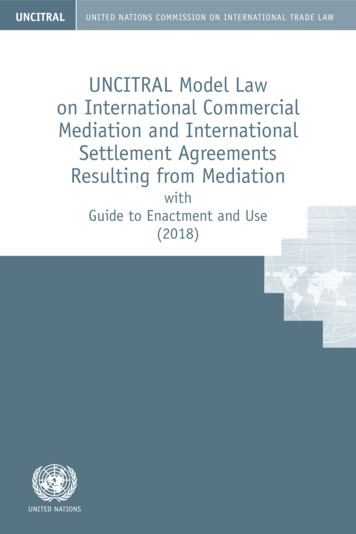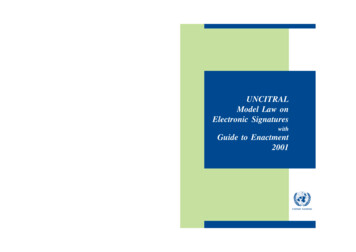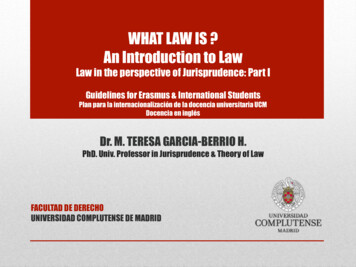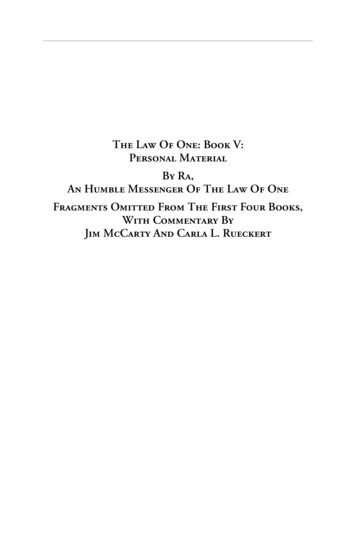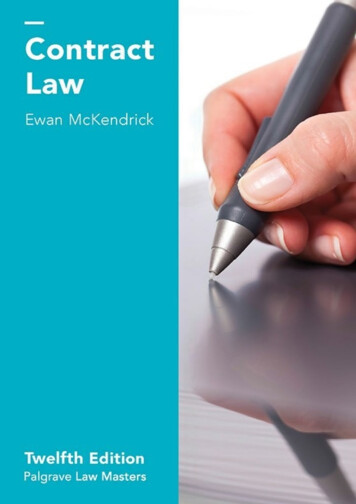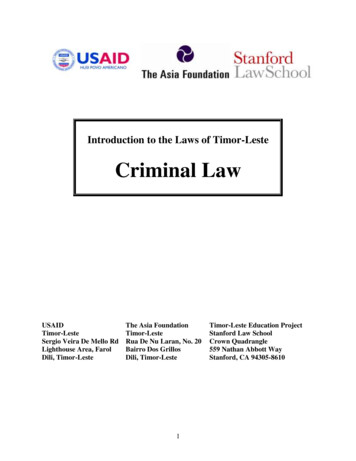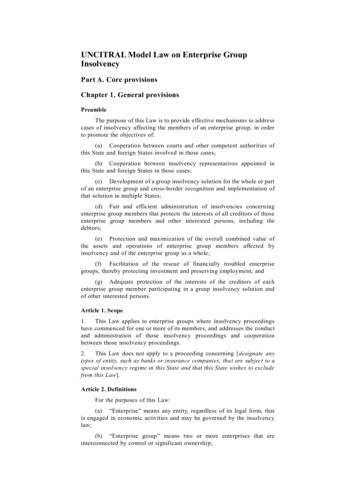
Transcription
UNCITRAL Model Law on Enterprise GroupInsolvencyPart A. Core provisionsChapter 1. General provisionsPreambleThe purpose of this Law is to provide effective mechanisms to addresscases of insolvency affecting the members of an enterprise group, in orderto promote the objectives of:(a) Cooperation between courts and other competent authorities ofthis State and foreign States involved in those cases;(b) Cooperation between insolvency representatives appointed inthis State and foreign States in those cases;(c) Development of a group insolvency solution for the whole or partof an enterprise group and cross-border recognition and implementation ofthat solution in multiple States;(d) Fair and efficient administration of insolvencies concerningenterprise group members that protects the interests of all creditors of thoseenterprise group members and other interested persons, including thedebtors;(e) Protection and maximization of the overall combined value ofthe assets and operations of enterprise group members affected byinsolvency and of the enterprise group as a whole;(f) Facilitation of the rescue of financially troubled enterprisegroups, thereby protecting investment and preserving employment; and(g) Adequate protection of the interests of the creditors of eachenterprise group member participating in a group insolvency solution andof other interested persons.Article 1. Scope1.This Law applies to enterprise groups where insolvency proceedingshave commenced for one or more of its members, and addresses the conductand administration of those insolvency proceedings and cooperationbetween those insolvency proceedings.2.This Law does not apply to a proceeding concerning [designate anytypes of entity, such as banks or insurance companies, that are subject to aspecial insolvency regime in this State and that this State wishes to excludefrom this Law].Article 2. DefinitionsFor the purposes of this Law:(a) “Enterprise” means any entity, regardless of its legal form, thatis engaged in economic activities and may be governed by the insolvencylaw;(b) “Enterprise group” means two or more enterprises that areinterconnected by control or significant ownership;
(c) “Control” means the capacity to determine, directly or indirectly,the operating and financial policies of an enterprise;(d) “Enterprise group member” means an enterprise that forms partof an enterprise group;(e) “Group representative” means a person or body, including oneappointed on an interim basis, authorized to act as a representative of aplanning proceeding;(f) “Group insolvency solution” means a proposal or set ofproposals developed in a planning proceeding for the reorganization , sale orliquidation of some or all of the assets and operations of one or moreenterprise group members, with the goal of protecting, preserving, realizingor enhancing the overall combined value of those enterprise group members;(g) “Planning proceeding” means a main proceeding commenced inrespect of an enterprise group member provided:(i) One or more other enterprise group members are participating inthat main proceeding for the purpose of developing and implementinga group insolvency solution;(ii) The enterprise group member subject to the main proceeding islikely to be a necessary and integral participant in that groupinsolvency solution; and(iii) A group representative has been appointed;Subject to the requirements of subparagraphs (g)(i) to (iii), the court mayrecognize as a planning proceeding a proceeding that has been approved bya court with jurisdiction over a main proceeding of an enterprise groupmember for the purpose of developing a group insolvency solution withinthe meaning of this Law;(h) “Insolvency proceeding” means a collective judicial oradministrative proceeding, including an interim proceeding, pursuant to alaw relating to insolvency in which proceeding the assets and affairs of anenterprise group member debtor are or were subject to control or supervisionby a court or other competent authority for the purpose of reorganization orliquidation;(i) “Insolvency representative” means a person or body, includingone appointed on an interim basis, authorized in an insolvency proceedingto administer the reorganization or liquidation of the enterprise groupmember debtor’s assets or affairs or to act as a representative of theinsolvency proceeding;(j) “Main proceeding” means an insolvency proceeding taking placein the State where the enterprise group member debtor has the centre of itsmain interests;(k) “Non-main proceeding” means an insolvency proceeding, otherthan a main proceeding, taking place in a State where the enterprise groupmember debtor has an establishment within the meaning of subparagraph (l)of this article; and(l) “Establishment” means any place of operations where theenterprise group member debtor carries out a non-transitory economicactivity with human means and goods or services.Article 3. International obligations of this StateTo the extent that this Law conflicts with an obligation of this Statearising out of any treaty or other form of agreement to which it is a party2
with one or more other States, the requirements of the treaty or agreementprevail.Article 4. Jurisdiction of the enacting StateWhere an enterprise group member has the centre of its main interestsin this State, nothing in this Law is intended to:(a) Limit the jurisdiction of the courts of this State with respect tothat enterprise group member;(b) Limit any process or procedure (including any permission,consent or approval) required in this State in respect of that enterprise groupmember’s participation in a group insolvency solution being developed inanother State;(c) Limit the commencement of insolvency proceedings in thisState, if required or requested; or(d) Create an obligation to commence an insolvency proceeding inthis State in respect of that enterprise group member when no suchobligation exists.Article 5. Competent court or authorityThe functions referred to in this Law relating to the recognition of aforeign planning proceeding and cooperation with courts, insolvencyrepresentatives and any group representative appointed shall be performedby [specify the court, courts, authority or authorities competent to performthose functions in the enacting State].Article 6. Public policy exceptionNothing in this Law prevents the court from refusing to take an actiongoverned by this Law if the action would be manifestly contrary to thepublic policy of this State.Article 7. InterpretationIn the interpretation of this Law, regard is to be had to its internationalorigin and to the need to promote uniformity in its application and theobservance of good faith.Article 8. Additional assistance under other lawsNothing in this Law limits the power of a court or an insolvencyrepresentative to provide additional assistance to a group representativeunder other laws of this State.Chapter 2. Cooperation and coordinationArticle 9. Cooperation and direct communication between a court ofthis State and other courts, insolvency representatives and any grouprepresentative appointed1.In the matters referred to in article 1, the court shall cooperate to themaximum extent possible with other courts, insolvency representatives andany group representative appointed, either directly or through an insolvencyrepresentative appointed in this State or a person appointed to act at thedirection of the court.3
2.The court is entitled to communicate directly with, or to requestinformation or assistance directly from, other courts, insolvencyrepresentatives or any group representative appointed.Article 10. Cooperation to the maximum extent possible under article 9For the purposes of article 9, cooperation to the maximum extentpossible may be implemented by any appropriate means, including:(a) Communication of information by any means consideredappropriate by the court;(b) Participation in communication with other courts, an insolvencyrepresentative or any group representative appointed;(c) Coordination of the administration and supervision of the affairsof enterprise group members;(d) Coordination of concurrent insolvency proceedings commencedwith respect to enterprise group members;(e)court;Appointment of a person or body to act at the direction of the(f) Approval and implementation of agreements concerning thecoordination of insolvency proceedings relating to two or more enterprisegroup members, including where a group insolvency solution is beingdeveloped;(g) Cooperation among courts as to how to allocate and provide forthe costs associated with cooperation and communication;(h) Use of mediation or, with the consent of the parties, arbitration,to resolve disputes between enterprise group members concerning claims;(i) Approval of the treatment and filing of claims between enterprisegroup members;(j) Recognition of the cross-filing of claims by or on behalf ofenterprise group members and their creditors; and(k) [The enacting State may wish to list additional forms or examplesof cooperation].Article 11. Limitation of the effect of communication under article 91.With respect to communication under article 9, a court is entitled at alltimes to exercise its independent jurisdiction and authority with respect tomatters presented to it and the conduct of the parties appearing before it.2.Participation by a court in communication pursuant to article 9,paragraph 2, does not imply:(a) A waiver or compromise by the court of any powers,responsibilitiesor authority;(b)A substantive determination of any matter before the court;(c) A waiver by any of the parties of any of their substantive orprocedural rights;(d)A diminution of the effect of any of the orders made by the court;(e) Submission to the jurisdiction of other courts participating in thecommunication; or4
(f) Any limitation, extension or enlargement of the jurisdiction ofthe participating courts.Article 12. Coordination of hearings1.A court may conduct a hearing in coordination with another court.2.The substantive and procedural rights of the parties and t hejurisdiction of the court may be safeguarded by the parties reachingagreement on the conditions to govern the coordinated hearing and the courtapproving that agreement.3.Notwithstanding the coordination of the hearing, the court remainsresponsible for reaching its own decision on the matters before it.Article 13. Cooperation and direct communication between a grouprepresentative, insolvency representatives and courts1.A group representative appointed in this State shall, in the exercise ofits functions and subject to the supervision of the court, cooperate to themaximum extent possible with other courts and insolvency representativesof other enterprise group members to facilitate the development andimplementation of a group insolvency solution.2.A group representative is entitled, in the exercise of its functions andsubject to the supervision of the court, to communicate directly with or torequest information or assistance directly from other courts and insolvencyrepresentatives of other enterprise group members.Article 14. Cooperation and direct communication between aninsolvency representative appointed in this State, other courts,insolvency representatives of other group members and any grouprepresentative appointed1.An insolvency representative appointed in this State shall, in theexercise of its functions and subject to the supervision of the court,cooperate to the maximum extent possible with other courts, insolvencyrepresentatives of other enterprise group members and any grouprepresentative appointed.2.An insolvency representative appointed in this State is entitled, in theexercise of its functions and subject to the supervision of the court, tocommunicate directly with or to request information or assistance directlyfrom other courts, insolvency representatives of other enterprise groupmembers and any group representative appointed.Article 15. Cooperation to the maximum extent possible under articles13 and 14For the purposes of article 13 and article 14, cooperation to themaximum extent possible may be implemented by any appropriate means,including:(a) Sharing and disclosure of information concerning enterprisegroup members, provided appropriate arrangements are made to protectconfidential information;(b) Negotiation of agreements concerning the coordination ofinsolvency proceedings relating to two or more enterprise group members,including where a group insolvency solution is being developed;(c) Allocation of responsibilities between an insolvencyrepresentative appointed in this State, insolvency representatives of othergroup members and any group representative appointed;5
(d) Coordination of the administration and supervision of the affairsof the enterprise group members; and(e) Coordination with respect to the developmentimplementation of a group insolvency solution, where applicable.andArticle 16. Authority to enter into agreements concerning thecoordination of insolvency proceedingsAn insolvency representative and any group representative appointedmay enter into an agreement concerning the coordination of insolvencyproceedings relating to two or more enterprise group members, includingwhere a group insolvency solution is being developed.Article 17. Appointment of a single or the same insolvencyrepresentativeA court may coordinate with other courts with respect to theappointment and recognition of a single or the same insolvencyrepresentative to administer and coordinate insolvency proceedingsconcerning members of the same enterprise group.Article 18. Participation by enterprise group members in an insolvencyproceeding commenced in this State1.Subject to paragraph 2, if an insolvency proceeding has commenced inthis State with respect to an enterprise group member that has the centre ofits main interests in this State, any other enterprise group member mayparticipate in that insolvency proceeding for the purpose of facilitatingcooperation and coordination under this Law, including developing andimplementing a group insolvency solution.2.An enterprise group member that has the centre of its main interests inanother State may participate in an insolvency proceeding referred to inparagraph 1 unless a court in that other State prohibits it from so doing.3.Participation by any other enterprise group member in an insolvencyproceeding referred to in paragraph 1 is voluntary. An enterprise groupmember may commence its participation or opt out of participation at anystage of such a proceeding.4.An enterprise group member participating in an insolvency proceedingreferred to in paragraph 1 has the right to appear, make written submissionsand be heard in that proceeding on matters affecting that enterprise groupmember’s interests and to take part in the development and implementationof a group insolvency solution. The sole fact that an enterprise groupmember is participating in such a proceeding does not subject the enterprisegroup member to the jurisdiction of the courts of this State for any purposeunrelated to that participation.5.A participating enterprise group member shall be notified of actionstaken with respect to the development of a group insolvency solution.Chapter 3. Appointment of a group representative andrelief available in a planning proceeding in this StateArticle 19. Appointment of a group representative and authority to seekrelief1.When the requirements of article 2, subparagraphs (g)(i) and (ii), aremet, the court may appoint a group representative. Upon that appointment,6
a group representative shall seek to develop and implement a groupinsolvency solution.2.To support the development and implementation of a group insolvencysolution, a group representative is authorized to seek relief pursuant to thisarticleandarticle 20 in this State.3.A group representative is authorized to act in a foreign State on behalfof the planning proceeding and, in particular, to:(a) Seek recognition of the planning proceeding and relief to supportthe development and implementation of a group insolvency solution;(b) Seek to participate in a foreign proceeding relating to anenterprise group member participating in the planning proceeding; and(c) Seek to participate in a foreign proceeding relating to anenterprise group member not participating in the planning proceedin g.Article 20. Relief available to a planning proceeding1.To the extent needed to preserve the possibility of developing orimplementing a group insolvency solution or to protect, preserve, realize orenhance the value of assets of an enterprise group member subject to orparticipating in a planning proceeding or the interests of the creditors ofsuch an enterprise group member, the court, at the request of the grouprepresentative, may grant any appropriate relief, including:(a)member;Staying execution against the assets of the enterprise group(b) Suspending the right to transfer, encumber, or otherwise disposeof any assets of the enterprise group member;(c) Staying the commencement or continuation of individual actionsor individual proceedings concerning the assets, rights, obligations, orliabilities of the enterprise group member;(d) Entrusting the administration or realization of all or part of theassets of the enterprise group member located in this State to the grouprepresentative or another person designated by the court, in order to p rotect,preserve, realize or enhance the value of assets;(e) Providing for the examination of witnesses, the taking ofevidence, or the delivery of information concerning the assets, affairs,rights, obligations, or liabilities of the enterprise group me mber;(f) Staying any insolvency proceeding concerning a participatingenterprise group member;(g) Approving arrangements concerning the funding of theenterprisegroup member and authorizing the provision of finance under those fundingarrangements; and(h) Granting any additional relief that may be available to aninsolvency representative under the laws of this State.2.Relief under this article may not be granted with respect to the assetsand operations located in this State of any enterprise group memberparticipatingina planning proceeding if that enterprise group member is not subject to aninsolvency proceeding, unless an insolvency proceeding was not7
commenced for the purpose of minimizing the commencement ofinsolvency proceedings in accordance with this Law.3.With respect to the assets and operations located in this State of anenterprise group member that has the centre of its main interests in anotherState, relief under this article may only be granted if that relief does notinterfere with the administration of insolvency proceedings taking place inthat other State.Chapter 4. Recognition of a foreign planning proceedingand reliefArticle 21. Application for recognition of a foreign planning proceeding1.A group representative may apply in this State for recognition of theforeign planning proceeding to which the group representative wasappointed.2.An application for recognition shall be accompanied by:(a) A certified copy of the decision appointingrepresentative; orthe group(b) A certificate from the foreign court affirming the appointment ofthe group representative; or(c) In the absence of evidence referred to in subparagraphs (a) and(b), any other evidence concerning the appointment of the grouprepresentative that is acceptable to the court.3.An application for recognition shall also be accompanied by:(a) A statement identifying each enterpriseparticipating in the foreign planning proceeding;groupmember(b) A statement identifying all members of the enterprise group andall insolvency proceedings that are known to the group representative thathave been commenced in respect of enterprise group members participatingin the foreign planning proceeding; and(c) A statement to the effect that the enterprise group membersubject to the foreign planning proceeding has the centre of its main interestsin the State in which that planning proceeding is taking place and that thatproceeding is likely to result in added overall combined value for theenterprise group members subject to or participating in that proceeding.4.The court may require a translation of documents supplied in supportof the application for recognition into an official language of this State.5.The sole fact that an application pursuant to this Law is made to a courtin this State by a group representative does not subject the grouprepresentative to the jurisdiction of the courts of this State for any purposeother than the application.6.The court is entitled to presume that documents submitted in supportof the application for recognition are authentic, whether or not they havebeen legalized.Article 22. Provisional relief that may be granted upon application forrecognition of a foreign planning proceeding1.From the time of filing an application for recognition of a foreignplanning proceeding until the application is decided upon, where relief isurgently needed to preserve the possibility of developing or implementing a8
group insolvency solution or to protect, preserve, realize or enhance thevalue of assets of an enterprise group member subject to or participating ina planning proceeding or the interests of the creditors of such an enterprisegroup member, the court may, at the request of the group representative,grant relief of a provisional nature, including:(a)member;Staying execution against the assets of the enterprise group(b) Suspending the right to transfer, encumber, or otherwise disposeof any assets of the enterprise group member;(c) Staying any insolvency proceeding concerning the enterprisegroup member;(d) Staying the commencement or continuation of individual actionsor individual proceedings concerning the assets, rights, obligations, orliabilities of the enterprise group member;(e) In order to protect, preserve, realize or enhance the value ofassets that, by their nature or because of other circumstances, are perishable,susceptible to devaluation, or otherwise in jeopardy, entrusting theadministration or realization of all or part of the assets of the enterprisegroup member located in this State to an insolvency representativeappointed in this State. Where that insolvency representative is not able toadminister or realize all or part of the assets of the enterprise group memberlocated in this State, the group representative or another person designatedby the court may be entrusted with that task;(f) Providing for the examination of witnesses, the taking ofevidence, or the delivery of information concerning the assets, affairs,rights, obligations, or liabilities of the enterprise group member;(g) Approving arrangements concerning the funding of theenterprisegroup member and authorizing the provision of finance under those fundingarrangements; and(h) Granting any additional relief that may be available to aninsolvency representative under the laws of this State.2.[Insert provisions of the enacting State relating to notice.]3.Unless extended under article 24, paragraph 1 (a), the relief grantedunder this article terminates when the application for recognition is decidedupon.4.Relief under this article may not be granted with respect to the assetsand operations located in this State of any enterprise group memberparticipating in a foreign planning proceeding if that enterprise groupmember is not subject to an insolvency proceeding, unless an insolvencyproceeding was not commenced for the purpose of minimizing thecommencement of insolvency proceedings in accordance with this Law.5.The court may refuse to grant relief under this article if such reliefwould interfere with the administration of an insolvency proceeding takingplace where an enterprise group member participating in the foreignplanning proceeding has the centre of its main interests.9
Article 23. Recognition of a foreign planning proceeding1.A foreign planning proceeding shall be recognized if:(a)2 and 3;The application meets the requirements of article 21, paragraphs(b) The proceeding is a planning proceeding within the meaning ofarticle 2, subparagraph (g); and(c)article 5.The application has been submitted to the court referred to in2.An application for recognition of a foreign planning proceeding shallbe decided upon at the earliest possible time.3.Recognition may be modified or terminated if it is shown that thegrounds for granting it were fully or partially lacking or have cease d to exist.4.For the purposes of paragraph 3, the group representative shall informthe court of material changes in the status of the foreign planning proceedingor in the status of its own appointment occurring after the application forrecognition is made, as well as changes that might bear upon the reliefgranted on the basis of recognition.Article 24. Relief that may be granted upon recognition of a foreignplanningproceeding1.Upon recognition of a foreign planning proceeding, where necess aryto preserve the possibility of developing or implementing a groupinsolvency solution or to protect, preserve, realize or enhance the value ofassets of an enterprise group member subject to or participating in theforeign planning proceeding or the interests of the creditors of such anenterprise group member, the court, at the request of the grouprepresentative, may grant any appropriate relief, including:(a)(b)member;Extending any relief granted under article 22, paragraph 1;Staying execution against the assets of the enterprise group(c) Suspending the right to transfer, encumber, or otherwise disposeof any assets of the enterprise group member;(d) Staying any insolvency proceeding concerning the enterprisegroup member;(e) Staying the commencement or continuation of individual actionsor individual proceedings concerning the assets, rights, obligations, orliabilities of the enterprise group member;(f) In order to protect, preserve, realize or enhance the value ofassets for the purpose of developing or implementing a group insolvencysolution, entrusting the administration or realization of all or part of theassets of the enterprise group member located in this State to an insolvencyrepresentative appointed in this State. Where that insolvency representativeis not able to administer or realize all or part of the assets of the enterprisegroup member located in this State, the group representative or anotherperson designated by the court may be entrusted with that task;(g) Providing for the examination of witnesses, the taking ofevidence, or the delivery of information concerning the assets, affairs,rights, obligations, or liabilities of the enterprise group member;10
(h) Approving arrangements concerning the funding of theenterprisegroup member and authorizing the provision of finance under those fundingarrangements; and(i) Granting any additional relief that may be available to aninsolvency representative under the laws of this State.2.In order to protect, preserve, realize or enhance the value of assets forthe purposes of developing or implementing a group insolvency solution,the distribution of all or part of the enterprise group member ’s assets locatedin this State may be entrusted to an insolvency representative appointed inthis State. Where that insolvency representative is not able to distribute allor part of the assets of the enterprise group member located in this State, thegroup representative or another person designated by the court may beentrusted with that task.3.Relief under this article may not be granted with respect to the assetsand operations located in this State of any enterprise group memberparticipating in a foreign planning proceeding if that enterprise groupmember is not subject to an insolvency proceeding, unless an insolvencyproceeding was not commenced for the purpose of minimizing thecommencement of insolvency proceedings in accordance with this Law.4.The court may refuse to grant relief under this article if such reli efwould interfere with the administration of an insolvency proceeding takingplace where an enterprise group member participating in the foreignplanning proceeding has the centre of its main interests.Article 25. Participation of a group representative in proceedings in thisState1.Upon recognition of a foreign planning proceeding, the grouprepresentative may participate in any proceeding concerning an enterprisegroup member that is participating in the foreign planning proceeding.2.The court may approve participation by a group representative in anyinsolvency proceeding in this State concerning an enterprise group memberthat is not participating in the foreign planning proceeding.Article 26. Approval of a group insolvency solution1.Where a group insolvency solution affects an enterprise group memberthat has the centre of its main interests or an establishment in this State, theportion of the group insolvency solution affecting that enterprise groupmember shall have effect in this State once it has received any approvalsand confirmations required in accordance with the law of this State.2.A group representative is entitled to apply directly to a court in thisState to be heard on issues related to approval and implementation of a groupinsolvency solution.Chapter 5. Protection of creditors and other interestedpersonsArticle 27. Protection of creditors and other interested persons1.In granting, denying, modifying or terminating relief under this Law,the court must be satisfied that the interests of the creditors of eachenterprise group member subject to or participating in a planning proceeding11
and other interested persons, including the enterprise group member subjectto the relief to be granted, are adequately protected.2.The court may subject relief granted under this Law to conditions itconsiders appropriate, including the provision of security.3.The court may, at the request of the group representative or a personaff
(d) "Enterprise group member" means an enterprise that forms part of an enterprise group; (e) "Group representative" means a person or body, including one appointed on an interim basis, authorized to act as a representative of a planning proceeding; (f) "Group insolvency solution" means a proposal or set of
